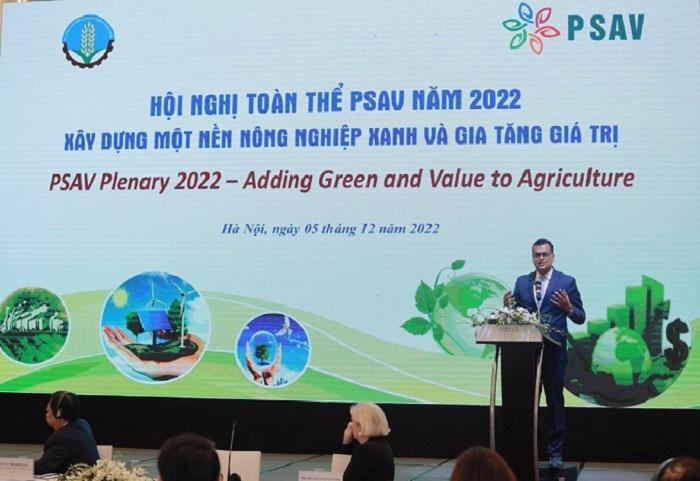[ad_1]
The Sustainable Agriculture Partnership (PSAV) Annual Meeting 2022 was held on December 5, 2022, co-chaired by Minister of Agriculture and Rural Development Le Minh Hoan and Mr. Binu Jacob – General Manager of Nestlé Vietnam Co., Ltd.
ENCOURAGE MULTIPLE COLLABORATION
Mr. Le Minh Hoan, Minister of Agriculture and Rural Development, said that Vietnam’s agricultural industry not only serves 100 million people in the country, but also ranks among the top 15 agricultural export powerhouses in the world, supplying markets in over 190 regions.
The PSAV program was launched in 2010 as part of the World Economic Forum’s (WEF) New Vision Initiative in Agriculture with the goal of 20-20-20 (productivity increase by 20%, reduction by 20%). poverty, 20% less emissions).
“The Department of Agriculture and Rural Development is coordinating with the World Economic Forum (WEF) to set up the Center for Food Innovation (FIH) linked to the development of green agriculture. We call on the business community as well as national and international organizations to participate in the preparation and implementation of the FIH.”
Mr. Le Minh Hoan, Minister of Agriculture and Rural Development.
Up to now, PSAV has 8 public-private working groups (PPPs), including groups on coffee, tea, vegetables, seafood, rice, spices and peppers, animal husbandry and chemicals, agriculture, involving 120 organizations including government agencies, companies, Industry associations, research institutes, international and non-governmental organizations.
“With the Vietnamese government’s pledge at the 26th Conference of the Parties to the United Nations Framework Convention on Climate Change (COP26) to net-zero emissions by 2050, we seek to make the transformation towards developing an ecological, low-carbon climate – neutral agriculture alongside the goal of food security,” stressed Minister Le Minh Hoan.
The Ministry of Agriculture and Rural Development of Vietnam has stipulated that all resources must be used to develop green agriculture. The implementation of the 2030 Agriculture and Rural Development Strategy and a 2050 Vision should encourage multilateral cooperation, including the public-private sector and partners across the supply chain, to engage in implementation in different regions of different scales to free up the investment resources of the whole society.

In order to achieve the goal of sustainable agriculture, Vietnam needs great efforts, not only from the government, but also from companies, direct producers.
Mr. Tran Thanh Vu, General Manager of Syngenta Vietnam Co., Ltd. said that Syngenta Vietnam has the role of co-leader of the fruit and vegetable industry working group; Core member of the PSAV working group on agrochemicals, coffee and pepper, spices. Therefore, Syngenta is always aware of its mission for the sustainable development of Vietnamese agriculture.
“With the strength of leading scientific and technological research in the field of agriculture, Syngenta has been actively involved in many coordinated activities with a range of private sector partners and NGOs. Governments, research institutes, universities and local authorities are implementing projects on coffee, peppers, Rice, potatoes… Anything to build a chain of production links. The production and consumption of agricultural products contribute to the control of food hygiene and safety, increase the value of agricultural products and improve farmers’ lives,” said Mr. Tran Thanh Vu.
Syngenta is always striving to offer new technological solutions to improve growing conditions; improve crop quality; bring real benefits to farmers.
At the PSAV Conference 2022, Syngenta and the Sustainable Agriculture Development Partnership of Vietnam (PSAV) signed a Memorandum of Understanding (MoU) on public-private cooperation to advance sustainable agricultural development.
The goal of the Memorandum of Understanding is to build value chain linkage models between farmers and markets to improve production processes, reduce costs, improve quality and ensure pesticide residues, and meet the export requirements of major international markets. The memorandum of understanding also mentions the pilot investments in new agricultural technologies and models to reduce land degradation, adapt to climate change and improve farmers’ incomes.
IMPROVE SUSTAINABLE FARM COFFEE
Binu Jacob, CEO of Nestlé Vietnam, said that Nestlé regenerative agriculture is being implemented in Vietnam through the NESCAFÉ plan and multi-stakeholder collaborative initiatives on sustainable agriculture launched in 2011.
Nestlé Vietnam has increased public-private collaboration with partners such as the Central Highlands Agro-Forestry Science Institute, Provincial Agricultural Advisory Centers, the Ministry of Agriculture and Rural Development and other organizations and partners.
“The program has helped farmers replant 63,000 hectares of old-growth coffee, reduced 40% of irrigation water and 20% of chemical fertilizers/pesticides, increased income by 30-100% using a sensible intercropping model, and reduced carbon emissions per kilogram of coffee harvested”.
Mr. Binu Jacob, CEO of Nestlé Vietnam.
The NESCAFÉ Plan program has successfully reached out to farmers in the central highlands, improved the quality of Vietnamese coffee beans, adopted sustainable farming practices, replanted ancient coffee trees and increased farmers’ incomes, secured livelihoods and empowered women farmers.
At the same time, regenerative agriculture improves soil quality and fertility and protects water resources and biodiversity. Improving soil quality also helps increase the soil’s ability to absorb carbon gas and reduce emissions.
In addition, NESCAFÉ Plan also helps educate farmers by applying digital transformation to their own coffee fields. In particular, the program has supported the development and construction of a tool for managing household diaries (Digital Farmer Field Book – FFB), which will help farmers to effectively manage production and business activities, control costs and profits and replace paper management; Simultaneously calculate the details of CO2 emissions on their coffee fields.
Mr. Binu Jacob added that as part of the Vietnam Coffee Day activities on December 9-11, 2022, Nestlé Vietnam and the Vietnam Coffee Association (VICOFA) will sign a cooperation agreement to build a sustainable coffee industry that preserves natural resources, ensuring social security and increasing the income of producers.
[ad_2]
Source link

